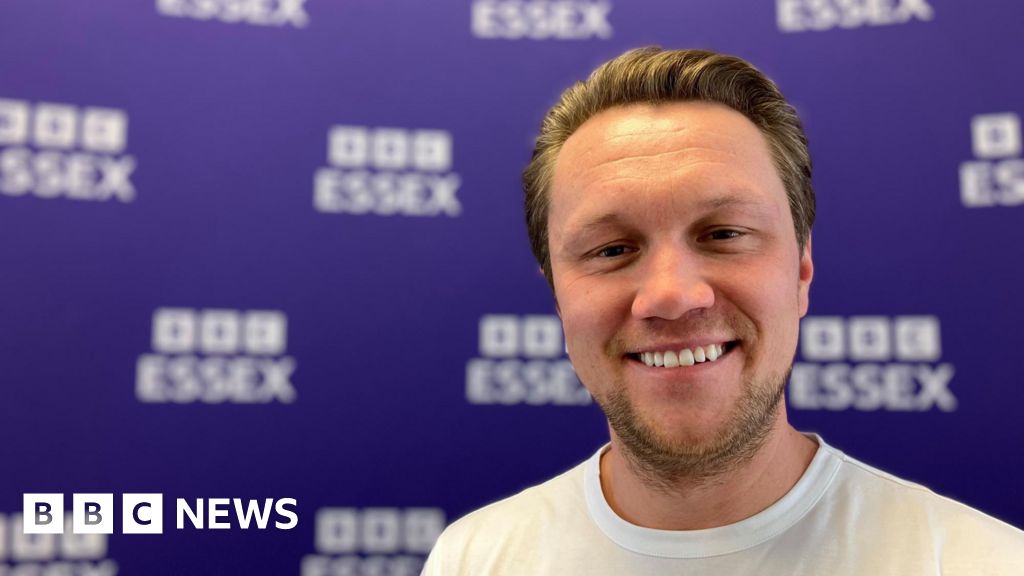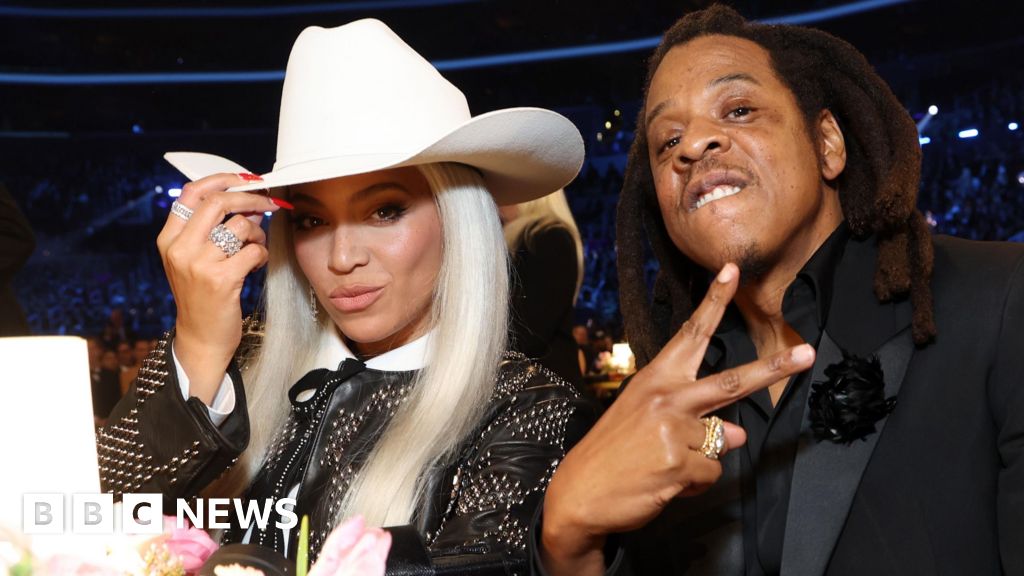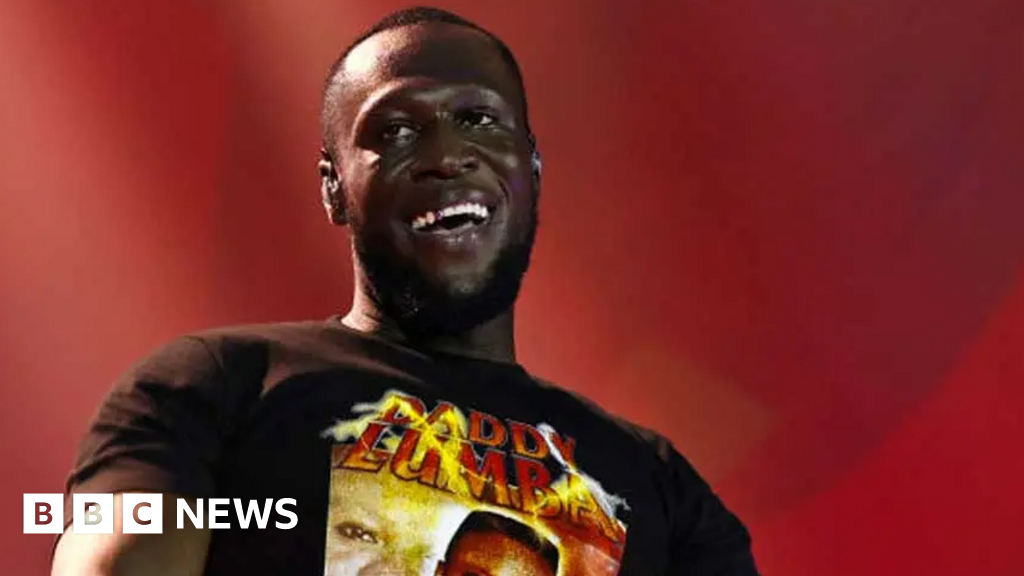ARTICLE AD BOX

By Chi Chi Izundu, Rob Brown & Jo Adnitt
BBC News
The X Factor offered its contestants the enticing prospect of instant fame and fortune, but they also ran the risk of humiliation and broken dreams.
Twenty years after it first appeared, contestants and staff have told the BBC what it was like to be part of the massively successful talent show, which ran from 2004 until 2018.
A new podcast, Offstage: Inside The X Factor, has spoken to scores of contestants and former staff members.
Among the revelations about the ITV show, which - at its peak - attracted an audience of nearly 17 million viewers, are claims of:
- A coding system to identify hopefuls who might "kick off" at the auditions
- Legal contracts signed in the early hours at a kitchen table
- A contestant being told to dampen her eyes, so she appeared to have been crying
- Complaints about a lack of aftercare for finalists
Auditions: 'Potential kick-off'
Tens of thousands of people queued up across the UK each year to audition for The X Factor. Only a tiny fraction ever made it to our screen - let alone the finals.
The auditions were our first glimpse of future stars like JLS, Leona Lewis or Harry Styles. But it wasn't just the talented singers who made the show so watchable.
Image source, PA Media
Image caption,Auditions for The X Factor attracted thousands across the UK
There were also the hopefuls who were simply good TV, as a former staff member explains.
"There was E for 'entertaining' and then the other one I remember is PKO which was 'potential kick-off'."
This was the coding system, she explains, used by production staff about auditionees.
"PKOs" were those who might fight back, yell or drop a mic in annoyance.
"I mean, we all remember the time where the girl punched her best friend," she says. "Any sense of that? You put them straight through."
Researchers and producers would do the initial audition, and decide whether to put someone in front of the judges.
Then, the show's co-creator Simon Cowell would deliver his frank opinion - and not only of their talent.
Image source, Getty Images
Image caption,Simon Cowell at The X Factor auditions in Liverpool, 2017
There was the time when he said that an all-female group looked like a WeightWatchers "before", "during" and "after" advert. On another occasion he told an auditionee she looked like an overweight "shopgirl".
It's hard to imagine a celebrity judge being allowed to comment on someone's weight anywhere on TV in 2024, let alone on primetime Saturday night.
We contacted Simon Cowell's representative for a comment - he chose not to respond to the points we put to him.
One former hopeful we spoke to says her self-confidence has never really recovered from the knock she received from the judges.
Sarah Lowe was 19 when she applied in 2005.
Like every contestant we spoke to, she had already been auditioned by production staff.
"They said: 'You've got an amazing voice, we think the judges are going to like you.' And I was like: 'This is brilliant.'"
Viewers saw Sarah singing a few bars of her song, before she was cut off by the judges.
"I mentally said 'No' as soon as you walked in, I'm afraid," Simon told her.
"He judged me before I even started to sing," says Sarah.
She was rejected by all three judges.
Sarah Lowe says her appearance on The X Factor in 2005 left her feeling "ashamed"
"I felt like my heart was going to explode, like, it broke me that much. And I just started crying."
But that wasn't the end of the story. As with many X Factor auditions, family members were waiting in the wings.
Sarah says a producer encouraged her then-fiance, her sister and her mum to enter the audition room and beg the judges to give her another chance. Sarah's sister and fiance even dropped to the floor on their knees in a futile bid to change Simon Cowell's mind.
The audition - and Sarah's rejection - became a talked-about moment. Newspapers focused on her appearance and wrote scathing comments.
Sarah says it all had a heavy impact on her mental health.
She was even mocked in the streets: "I went into Asda, and there was a lady getting on her hands and knees and saying, 'Please, Simon, can I have some more?' I was so ashamed."
Some of the production staff on The X Factor told us they too felt concerned about other auditions. Many spoke to us on condition of anonymity because they still work in TV.
It promised fame and fortune, but at what cost? Chi Chi Izundu looks back at the good and bad of one of Britain's biggest TV shows.
"There was one guy who was clearly mentally vulnerable," recalls a former runner for the show. "I still remember his face - he was so excited. And my heart sort of broke for him because I felt like, 'Oh you're being used.'" (The former runner does not know whether this audition ever made it to the screen).
Fremantle - the production company behind the X Factor - says it implemented training for staff on awareness and recognition of mental health issues, and these processes were improved and evolved year-on-year.
It denies putting vulnerable people through the auditions for entertainment. A spokesperson said it was an open-call talent show anyone could enter.
Kitchen table legal deals
After the early rounds - the auditions, boot camp and the judges' houses - a lucky few were left to fight it out in the live shows.
Most of them moved into a luxury house together, normally on the outskirts of London.
It was usually their first taste of a pop-star lifestyle. Sophia Wardman - a contestant in 2010 - remembers arriving at the house and finding an array of free gifts on her bed. "You were treated like pure royalty going in," she says. "It was really fun."
But with the live shows came hectic schedules and intense pressure on contestants, some of whom had never lived away from home before.
Bradley Hunt, who competed in 2016 as one half of the duo, Bratavio, remembers "crying in the shower with exhaustion".
Image source, Bradley Hunt
Image caption,Bradley Hunt competed in 2016 as one half of a duo, Bratavio
With the prospect of lucrative recording deals for the winners and the runners-up, contracts had to be signed.
All the contestants we spoke to said Fremantle would present them with a choice of three lawyers.
Sophia Wardman says it was a confusing process: "None of us had a clue about who's good at music law… We were all just, like: 'She's all right. Let's pick her.'"
The three lawyers would pitch for the job and the successful one would represent everyone in the house.
Another contestant recalls an early start of breakfast TV interviews and a full and busy day, ending at two o'clock in the morning: "And coming into the house, in the kitchen, there's lawyers sitting at the table, wanting us to sign [contracts] there and then."
Fremantle says that contestants were given a choice of independent legal advisers - all of whom were music industry specialists - to advise them on agreements with the recording company.
Image source, Getty Images
Image caption,Sophia Wardman was a contestant in 2010
Living together in the house brought its own pressures.
Contestants were regularly filmed to capture every twist and turn for the show - or for spin-off shows such as The Xtra Factor.
Occasionally they felt they were encouraged to create moments of drama.
Laura Conway and her sisters were contestants in 2005. She remembers one such occasion: "The producers made me put water on my eyes and smudge my mascara… and made it look like I was crying. That was a total set-up."
Image source, Getty Images
Image caption,Laura Conway (far left) and her sisters competed on the show in 2005
Junior members of staff lived in the house and were responsible for managing the contestants' gruelling schedules of rehearsals and media appearances.
A former researcher says the experience could be stressful for staff as well.
Tom (not his real name) says that even though he and his colleagues were mostly the same age as the contestants, they found themselves playing a parental role.
He recalls one contestant who was attracting a lot of negative media attention, and was struggling to deal with those stories, and the pressure of being on the show. She started displaying erratic behaviour, he says, as a "cry for help".
"No-one said we were responsible for their welfare," says Tom. "But these kids were worked to the bone. So what do you do?"
Fremantle says: "Duty of care is of the utmost importance to us, and we take the welfare of everyone involved in its shows, including contestants and members of the production team, incredibly seriously with thorough and robust support systems in place."
In the tabloid glare
The X Factor turned unknowns into overnight celebrities. It could be difficult to deal with.
Reporters started hanging around outside Laura Conway's school in County Sligo in Ireland: "One of my ex-boyfriends said he was approached [and] offered a couple of thousand for a bad story about me."
On another occasion, she was leaving the X Factor studios and a paparazzi photographer put his camera under her skirt. "It just felt like there was a culture [where] this behaviour was acceptable," she says.
This was a time before social media, when the UK tabloid press were far more powerful. Celebrities and shows such as The X Factor needed newsprint coverage, and newspapers in their turn were ravenous for showbiz exclusives to boost sales.
Image source, PA Media
Image caption,Former X Factor judge Cheryl attending a show event in London 2015
Stories were appearing in the press about contestants. Laura remembers how the subject of a supposedly private conversation made it into the papers the following week.
"We just didn't understand how the information got out," she says. "So there was a point where we started being careful, even talking among ourselves."
And the winner is…
Sam Bailey entered The X Factor in 2013.
"I wanted a new kitchen," she says. "I figured if I go on the X Factor I'll be able to get more money when I sing up at the Dog and Duck."
The audience loved her voice, and loved her story - a working mum, holding down a job as a prison officer while pursuing her dream of being a professional singer.
But what happens when you win one of the biggest shows in the world?
Image source, Getty Images
Image caption,Sam Bailey won The X Factor in 2013
She gained an entourage - there was a management company, a record label representative, make-up artists...
Elton John wanted a selfie with her, Sharon Osbourne gave her Louis Vuitton luggage for a present, and her debut single was the Christmas No 1 that year.
Sam says she was mobbed the first time she tried to go to the supermarket: "One thing that you're never prepared for is… how many people just want to come up and say hello to you, and have photos with you."
That was the winner's experience. But for most other contestants we spoke to, there was a sudden fall to earth.
After being knocked out, Sophia Wardman was soon back in her home town of Scarborough.
"I've just been on the biggest TV show in the country and I can't pay my rent," she recalls. "Within a month I'm back working in the bar at home."
After Bradley Hunt and his singing partner were eliminated in 2016, they did a round of interviews, and then he says they were put in a car.
"Not even the researchers said bye or anything," he adds. "I was so exhausted and so tired that I fell asleep in Marylebone Station on the floor."
Fremantle says there was no time limit on aftercare once the show had aired, and adds that "we have always been proactive in adapting and updating [measures] for future shows".
Since The X Factor came off air in 2018, new broadcasting rules have been put in place to protect the welfare of reality show contestants.
The aftermath
How do the former contestants look back on their time on one of the UK's biggest shows?
Laura Conway says she regrets it "100%", and adds, "I think personally it set me back many years." Nevertheless, she has found success in the music industry as a composer and singer.
Sophia Wardman is also in the business, as a music manager. She says she kept quiet about her X Factor past when she started work - but she says she now uses her experience to help her artists navigate the music industry.
Sophia Wardman is now a music executive
Bradley Hunt makes TikTok videos about his X Factor experience - some of which have had millions of views. He says that being on the show was not for the faint-hearted, but "if you can get through it all and the ups and downs, then it was good… I don't regret it".
And Sam Bailey? She's still making a good living as a performer.
"I've got so many stamps in my passport and I've got some money in my bank," she says. "My daughter's at uni. She's the first one in my family to go to uni. Could I have afforded that if I hadn't have done this? No."

 1 year ago
96
1 year ago
96








 English (US) ·
English (US) ·